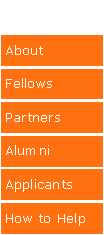


|
Fellows’ Flyer |
|
September 2009 |
|
News and views for and by Princeton in Africa Fellows |
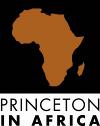

|
In this Issue: |
|
Highlights from 2009-2010 Fellows Krista Ford in Tanzania and Etzerson Philitas in South Africa |
|
The Princeton in Africa Medal will be presented to Thomas C. Barry CEO and Founder of Zephyr Management
The Princeton in Africa Lifetime Achievement Award will be presented to Julius Coles *66 President of Africare
Click here to purchase tickets or for more information
We hope you will join us! |
|
2009 Annual Benefit October 1, 2009 in New York City |
|
‘09-‘10 Fellows Update
Most of our newest PiAfers have now landed in Africa and have begun their fellowships. Want to see where they are working? Click here to check out our Google map.
2009-2010 Fellows By the Numbers...
Number of Fellows: 25
Number of organizations hosting Fellows: 14
Number of countries in which Fellows were placed: 16
Number of languages spoken by Fellows: 18 (including Swahili, Amharic, Bambara, and Fulfulde)
Number of fields Fellows majored in: 10 (including Ecology & Evolutionary Biology, Anthropology, Religious Studies, History, and the Woodrow Wilson School of Public and International Affairs) |

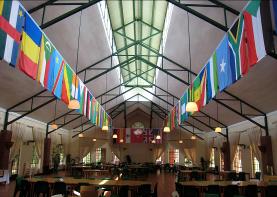

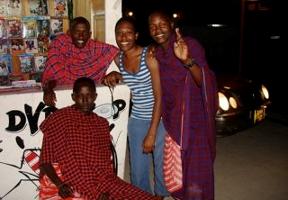
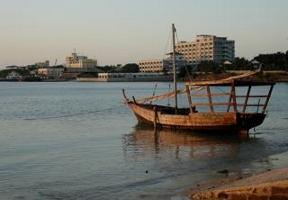

|
On the last Monday in June, I showed up at the Africare office in Dar es Salaam ready to begin my first workweek. Within half an hour of my arrival I was told that I would be accompanying a program manager and a finance manager on a trip into the field. They were checking up on some projects and they thought it would be a good idea for me to tag along and witness the actual impact of the program.
On Tuesday I showed up to work at 8 a.m. with my big black duffel packed full of comfortable clothing and hand sanitizer and sat patiently at my desk waiting for our 9 a.m. take-off time to roll around. Of course, since I’m in Africa, 9 o’clock came and went without so much as a mention of the trip. After my third cup of chai maziwa (tea with milk) I decided to venture out of my “office” to find out what was going on. By 1 o’clock I was strapped into the front seat of the company’s Land Cruiser next to Jamal, our driver.
Our convoy jiggled over the crude, rocky path until the first white truck turned off onto an even more ragged “road.” Dusty children clad in mere rags appeared beyond my window. My heart leapt a little. When the truck stopped I climbed out and approached the children. “Shikamoo,” they greeted me. (Respectful greetings, Elder.) “Marahaba,” I replied. (Thank you for the respectful greeting, young one.) I turned at the sound of footsteps on the dry leaves and saw a tiny woman about my mother’s age emerging from a crude structure made of sticks and wild grasses. A young child clambered about the spot where I knew her knees must have been under the torn and poorly mended wrapper. “Shikamoo, Mama,” I passed the greeting to her. “Marahaba,” she replied. One sooty eyelid peeked from behind her.
She and the program manager exchanged words and she gestured for us to follow her. We walked around the back of the hut and she pointed to a small lean-to. “Karibu. Ingia.” (You are welcome. Enter.) I was easily the tallest person amongst us and I had to curve my spine severely to fit under the porous roof. I heard strange noises and when my eyes adjusted to the dim haze I saw I had been ushered into the village chicken coop. The Mama explained that the family has used the resources they’ve received from Africare’s COPE (Community-Based Orphan Protection and Empowerment Project) to start a small chicken farm. She shepherded us into an even smaller section of the structure and pointed to a spot under a makeshift bench.
“Nini?” I asked her. (What?) She clasped her hands under her chin and grinned ear to ear. “Mayai,” she told me proudly. (Eggs.) I lit the flashlight on my phone and sure enough there were nine ivory eggs perched in a delicate pyramid. I closed my eyes and said a silent prayer of gratitude and when I opened them again, they threatened to spill over.
This trip opened my eyes to the importance of the work we do and I’m excited about the time I’ll spend documenting the implementation of Africare’s COPE project, which targets orphans and vulnerable children and their caregivers with HIV/AIDS awareness activities, block grants to schools, and income generation activities for caregivers in four countries. As the COPE project phases out at the end of 2009 I’ll be helping to develop phase two of Tanzania’s OVC (orphans and vulnerable children) programming under the President’s Emergency Plan Fund for AIDS Relief. I’m looking forward to the field visits to come and I’m hoping to witness many more success stories like this one from Kondoa.
And I am extremely grateful to Hope Through Healing Hands, a non-profit organization chaired by Senator Bill Frist, MD, for its support and sponsorship of my fellowship with Africare this year. |
|
by Krista Ford, ‘09-’10 Fellow at Africare in Tanzania |
|
Notes from the Field |
|
Krista, with a herd of cows is passing behind her on Kipepeo beach |
|
A view of the downtown Dar cityscape from the shore |
|
Krista, hanging out with some Massai men she befriended |
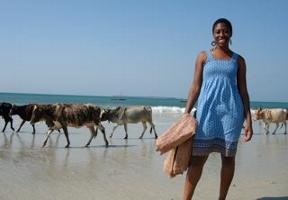

|
Women and children are carrying baskets up a hill in the Uluguru mountains (in Morogoro) |

|
“Never doubt that a small group of thoughtful, committed citizens can change the world. Indeed, it is the only thing that ever has.” This quote from Margaret Mead exemplifies the intended impact of an organization like African Leadership Academy.
African Leadership Academy (ALA) is a social entrepreneurship endeavor that seeks to transform the African continent through the development of leaders. The founders of ALA identified the lack of effective leadership as the major variable which has hindered social, political, and economic progress on the African continent. While some have pointed to factors such as colonialism, racism, or climate as causes for Africa’s lack of development, ALA espouses the belief that those factors are out of the control of Africa’s populations. As a result, those factors are not at the root of solving the continent’s lack of development. The only means of bringing Africa true prosperity is through the development of poignant and effective leadership. Through the education and support of the continent’s brightest minds, the organization hopes to endow its student body with leadership qualities and change the continent by transforming youth into thoughtful, committed citizens.
ALA is still very much a start-up, and most team members wear multiple hats. As such, my role has been threefold. Upon arriving at ALA, I was tasked with leading the efforts to ramp-up the campus to accommodate the increase in student volume. Last year was ALA’s inaugural academic session, with only 100 students. This year, however, the student body has doubled from 100 to 200. This involved analyzing and executing the procurement budget, overseeing campus renovations, and liaising with third-party suppliers to renegotiate contracts and service agreements. Secondly, I’ve been asked to develop a comprehensive SAT program for the students. In order to assure that ALA students are competitive on the American university landscape, it’s imperative that they do well on the SAT. Lastly, I’ve been asked to help with developing and rolling-out ALA’s conferencing business, which leverages the campus’ facilities for conferencing and convention purposes.
In addition to working with ALA, I’ve begun working with the Umuzi Photo Club. Umuzi Photo Club seeks to give youths in Diepsloot and Soweto exposure to photography and creative expression. By leveraging their experiences through photography, the students are able to tell their stories and become more critical appraisers of their surroundings. The organization aspires to equip learners with practical skills in photography and visual literacy in an entertaining and participatory manner. Photography is a rare creative outlet for the learners, whose schools lack the funding necessary to provide art programs.
Umuzi sponsors exhibitions of the students’ work periodically at galleries in South Africa, the United States, and Europe with the intention of selling high-quality prints. The proceeds support the funding of development projects identified by the schools we serve. My role with the organization is to effectively guide the proceeds from the exhibitions back into the students’ schools and communities. |
|
by Etzerson Philitas, ‘09-’10 Fellow at African Leadership Academy in South Africa |
|
Notes from the Field |
|
ALA’s curriculum includes a traditional academic core, including courses like this chemistry class, as well as courses in leadership, entrepreneurship, and African studies |
|
Flags hang in ALA’s dining hall to represent the countries that each student comes from |

|
Ettie, prior to his departure for South Africa |
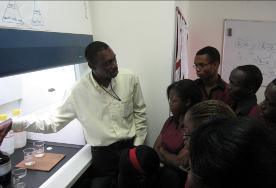
|
Save the date! On October 20th, PiAf will be screening Pray the Devil Back to Hell, an award-winning documentary about the Liberian women who tirelessly worked to bring an end to their country’s civil war and bring peace back to their shattered country. The film will be shown on Princeton’s campus. Co-sponsored by Carl A. Fields Center for Equality & Cultural Understanding. |
|
Pray the Devil Back to Hell |
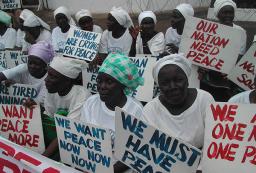
|
Liberian women demonstrate in Monrovia at the height of the civil war in July 2003 Photo credit: Pewee Flomoku |

|
PiAf Voices |


|
Emily Holland ‘01, one of our first PiAf Fellows, has recently created a series of videos that feature some of our alumni reflecting on their experiences as Princeton in Africa Fellows. We invite you to hear these “PiAf Voices” as they share their stories! |
|
Hear Renee Hsia (PiAf 1999) speak about her fellowship in Rwanda |
|
Click here to see all of the videos in our “PiAf Voices” series. |
|
Hear Kristina Scurry Baehr (PiAf 2004-2005) talk about her fellowship in Uganda |

